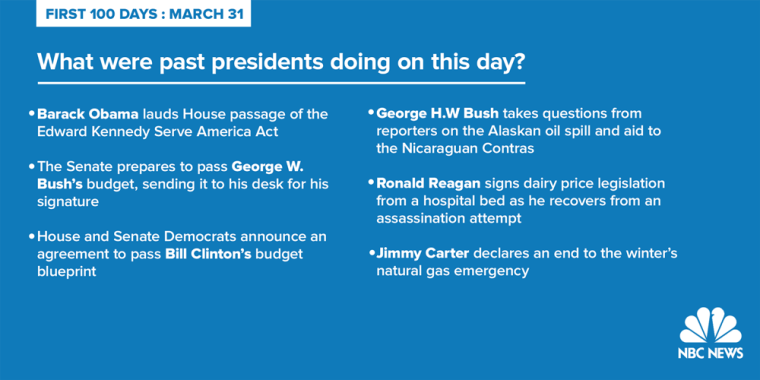First Read is a morning briefing from Meet the Press and the NBC Political Unit on the day's most important political stories and why they matter
After 10 weeks, Trump teeters on the brink
Just 10 weeks on the job, President Trump’s approval rating is stuck in the 30s and 40s. His health-care effort failed. The travel ban is tied up in courts. Congress and the FBI are investigating his campaign’s possible links to Russia. He’s calling out fellow Republicans for failing to help him on health care. His White House tried to cover up (for a while at least) his aides providing information to House Intelligence Chairman Devin Nunes. And now his ousted national security adviser says he’ll cooperate with the FBI and Congress in exchange for immunity.
Any one of these stories would ensnare a presidency in a crisis. But you add up these seven storylines above — we’re sure we’re leaving others out — and it’s unsustainable. Conservative commentators are already hitting the panic button. “Crisis reveals the character, the essential nature of a White House. Seventy days in, that is my worry,” Peggy Noonan writes in the Wall Street Journal. Adds former George W. Bush speechwriter Michael Gerson: “This is a pretty bad combination: empty, easily distracted, vindictive, shallow, impatient, incompetent and morally small. This is not the profile of a governing party.” This is a presidency on the brink of a free-fall, and it has to start repairing the damage on all of these fronts — popularity, the agenda, congressional relations, Russia, Flynn.
70 days of scandals and controversies
In the waning days of the 2016 presidential election, one of the central arguments that Trump made against Hillary Clinton was that scandal and controversy would always follow her, especially if she became president. “Hillary Clinton is the most corrupt person ever to seek the office of the presidency of the United States,” he said while campaigning in Michigan on Nov. 6. “The investigations into her crimes will go on for a long, long time. The rank and file special agents at the FBI won't let her get away with her terrible crimes.” But now beginning the 11th week of his presidency, scandal and controversy — both small and potentially big — have enveloped the Trump White House. A timeline:
- February 13: National Security Adviser Michael Flynn resigns after not being honest about his contacts with Russia's ambassador.
- February 15: White House Chief of Staff Reince Priebus asks FBI to knock down reporting on contacts between Trump campaign and Russians known to U.S. intelligence.
- March 2: Attorney General Jeff Sessions recuses himself from any federal inquiries involving Trump’s campaign after the Washington Post reported he met twice with Russia’s envoy -- which he didn’t disclose in his confirmation hearing.
- March 4: Trump accuses the former President Barack Obama of wiretapping -- without presenting any evidence.
- March 20: FBI Director James Comey confirms his agency is investigation allegations that Trump's 2016 campaign might have contacts with Russian entities.
- March 30: The New York Times names two White House officials who helped provide House Intelligence Committee Chair Devin Nunes with information showing that Trump and his associates were incidentally swept up by U.S. surveillance. And the Washington Post names a third White House official.
- March 30: Ousted National Security Adviser Flynn tells the FBI and Congress that he’s willing to testify in exchange for immunity.
Flynn back in 2016: “When you are given immunity, that means you’ve probably committed a crime”
It’s important to point out that when someone seeks immunity, that isn’t a smoking gun that the person committed a wrongdoing. But these words that Flynn said on “Meet the Press” back on Sept. 25, 2016 is going to haunt him and Team Trump: “When you are given immunity, that means you’ve probably committed a crime.”
Katie Walsh’s departure is a blow to Priebus
Two administration officials confirmed to NBC’s Kristen Welker Ali Vitali yesterday that Deputy Chief of Staff Katie Walsh has departed the White House to work for pro-Trump groups outside the administration. "Katie Walsh has accepted a position with an outside organization,” a senior administration official said. “She has been a tremendous asset to the president and we are confident she will be so in her new role as well.” But a deputy chief of staff leaving after 70 days on the job is VERY suspicious, and it’s a huge blow to Chief of Staff Reince Priebus, since Walsh has long been an ally/associate of his.
Schumer: “We shouldn’t have changed the rules for lower court judges”
This is a striking comment from Senate Minority Leader Chuck Schumer – he says he disagreed with Harry Reid’s effort to change the Senate rules to get Barack Obama’s judges through the Senate in 2013-2014. “We made one mistake, we shouldn't have changed the rules for lower court judges ... but we never did it for Supreme Court. This is a much bigger mistake on their behalf," Schumer told the AP.
Schumer and McConnell to appear on “Meet the Press”
And on “Meet” this weekend, NBC’s Chuck Todd will interview Schumer and Senate Majority Leader Mitch McConnell.
What were other presidents doing on March 31?




